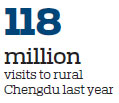Rural tourism in metropolis sees significant boost
The bed-and-breakfast industry has emerged in rural Chengdu in recent years, becoming a new window for countryside tourism and an engine for local rural revitalization.
A monthlong B&B experience event started in the capital of Southwest China's Sichuan province in late July, with 17 traveling routes related to B&B businesses launched.
The first experience team, comprising 24 people from eight families, spent two days at a homestay in Dujiangyan, a city under the administration of Chengdu that's known for an ancient irrigation project with the same name.
The homestay, Xianzai Houshe, was recently renovated to include corridors connecting separate old-style residential buildings. The homestay, together with other two hotels in Dujiangyan, was among 43 candidates competing for a spot on the Global Top 10 "Must Stay" Vacation Rental list. The evaluation was part of a cultural tourism accommodation forum held in Shanghai in May.
To date, Dujiangyan is home to more than 100 homestays.

Xianzai Houshe is not far away from a noted scenic site in Liujie town in Dujiangyan. The scenic site has a 10-kilometer-long greenway running through, stringing together a rural landscape, farms and villages, modern agriculture and local delicacies.
The eight families learned farming knowledge in the area and each got a task card. Their tasks included taking a walk in the field, teaching kids a poem, writing a letter to the future and making a present for their mothers.
"The two-day experience is precious to our family," said participant Jiang Shu. He suggested tourists stay overnight in Dujiangyan.
"In the daytime, the scenic areas and old streets are crowded with people," Jiang added. "But at night after tourists leave, you can enjoy the city's tranquility. Sitting in the hotel's balcony, you can hear the wind humming, birds and cicadas sing and also the Minjiang River roaring through Dujiangyan."
The homestay experience event coincided with a national rural tourism conference held in Chengdu on July 28. Attendees of the conference visited rural resorts such as the Xu's Family Courtyard in Nongke village, a farmstead in Zhanqi village and a Sichuan cuisine museum in Gucheng town.
Zhanqi village, the venue of the conference, does not have an abundance of tourism resources. But in recent years, the village has explored local characteristics to develop rural tourism. It attracted companies that produce edible fungus and process agricultural and sideline products. The village built organic vegetable and flower planting centers, launched sight-seeing agriculture focused on strawberry and blueberry picking, and developed a featured shopping street.
Chengdu has developed 10 rural tourism development modes, including cultural creativity plus countryside, intangible cultural heritage tourism, vacations in mountainous regions and motor home holidays.
On the first list of China's key rural tourism villages, released by the Ministry of Culture and Tourism on July 28, four were from Chengdu.
The city's rural tourism received 118 million visitors in 2018, a year-on-year rise of 10.2 percent, generating more than 39.38 billion yuan ($5.61 billion) in annual income.
songmengxing@chinadaily.com.cn
(China Daily 08/08/2019 page5)














